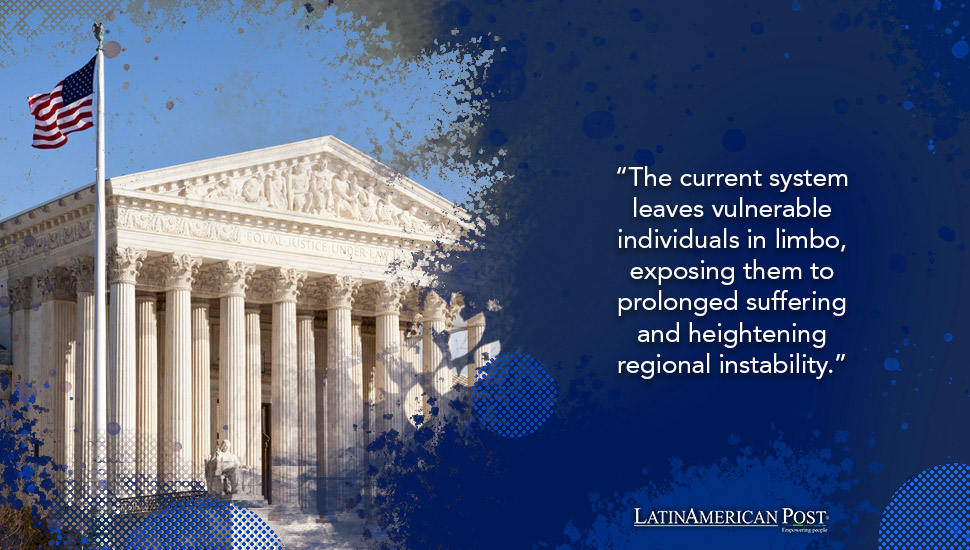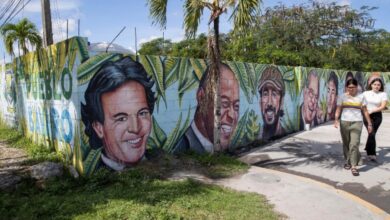Backlogged and Forgotten: Latin America’s Struggles in the U.S. Immigration System

The immense backlog in U.S. immigration courts disproportionately affects worthy applicants from Latin America. The current system leaves vulnerable individuals in limbo, exposing them to prolonged suffering and heightening regional instability.
The staggering increase in immigration court backlogs from 500,000 cases in 2016 to over 3.6 million by mid-2024 is no mere statistic—it represents an overwhelming failure reverberating across borders. Many of these cases involve asylum seekers from Latin American countries who are fleeing violence, political persecution, and economic instability, only to face an asylum process plagued by inefficiencies and inconsistencies.
Latin American asylum seekers often find themselves caught in an arduous system that can take years, even decades, to resolve their cases. The consequences of this backlog are profound and detrimental, especially for those with legitimate claims. As the backlog grows, so does the wait time for a decision, forcing many to live in uncertainty for years.
For example, asylum seekers from countries like Venezuela, El Salvador, and Honduras—where state oppression, cartel violence, and political instability are rampant—are left in a bureaucratic limbo. These individuals have escaped countries where the rule of law has crumbled, only to face an opaque and deeply flawed U.S. system that offers no guarantee of protection or justice.
A Political and Humanitarian Crisis
The political pressure to stem the flow of migrants at the southern border has exacerbated the problem. With asylum being one of the few legal avenues available to migrants who arrive without documentation, many have turned to this process out of desperation. Unfortunately, the U.S. government’s response has been more focused on reducing the number of new asylum seekers rather than addressing the systemic issues.
Under pressure to reduce the backlog, immigration judges are often forced to move cases more quickly, sometimes at the expense of a fair hearing. Political interventions, such as President Biden’s recent freeze on new asylum applications when border encounters exceed a certain threshold, further strain an already overwhelmed system. This decision, aimed at curbing the surge of new arrivals, has had the unintended consequence of pushing legitimate asylum seekers back into danger.
For many Latin American countries, such as Nicaragua and Guatemala, asylum seekers are fleeing extreme violence or government persecution. Those who manage to cross the border and seek asylum are met with a system in disarray—where their cases may take years to be heard, and their fate hinges on which judge they are assigned.
In regions such as Central America, where the presence of gangs and corrupt governments can make everyday life unbearable, families are fleeing for their lives. Yet, even when their claims are strong, the system fails to provide timely protection. Many are left in limbo, caught between the country they fled and the uncertainty of whether they will be allowed to stay in the U.S. or deported back into the hands of those they escaped.
The Human Cost of Inefficiency
The inefficiency of the U.S. immigration system has a direct and devastating impact on the lives of asylum seekers. Pending asylum claims accounted for almost 1.3 million cases in the backlog by the end of 2023, leaving people in legal limbo for years. These delays not only place incredible stress on individuals and families but also put lives at risk.
The backlog forces many applicants, particularly those from Latin America, to live in constant fear and uncertainty. Even for those eventually granted asylum, the damage caused by years of waiting cannot be undone. Many endure psychological trauma, financial instability, and separation from their families while they wait for a decision that could mean the difference between life and death.
In addition, there are regions where fleeing to the U.S. is seen as the only viable option. In places like Haiti, Cuba, and parts of South America, political unrest, economic collapse, and human rights abuses have driven thousands to seek asylum. These individuals have often exhausted every avenue of safety in their home countries, only to find that the U.S. asylum system, which once promised refuge, is buckling under the weight of too many cases and too few resources.
Political Meddling and Judicial Inconsistencies
Part of the reason for the backlog’s unmanageable growth lies in the structure of the U.S. immigration courts, which are not part of the judicial branch but are instead overseen by the executive branch. This system creates a vulnerability to political meddling, where court rulings can be influenced by the political climate rather than the facts of the cases themselves.
Immigration judges, who are supposed to assess the legitimacy of asylum claims impartially, are often subject to political pressures to deny more cases to reduce the backlog. This has led to vast inconsistencies in asylum rulings, with approval rates varying wildly depending on which judge is assigned to the case.
For Latin American asylum seekers, this inconsistency can be particularly damaging. One judge might grant a refugee from Venezuela fleeing persecution under the Maduro regime asylum, while another judge might deny an identical case. The lack of consistency undermines trust in the system and makes it nearly impossible for asylum seekers to gauge their chances of success.
Moreover, the arbitrary nature of the rulings leads to widespread confusion and panic. Instead of receiving clear guidelines, individuals and families from Latin America are left to navigate a system where the outcome of their cases is more like a lottery than a matter of legal principle.
Fixing a Broken System
Systemic reforms are essential to restore faith in the U.S. immigration system, particularly for those fleeing violence and persecution in Latin America. First and foremost, the courts must be freed from political interference. Creating an independent immigration court system, separate from the executive branch, would be a vital first step in ensuring that cases are judged based on merit rather than political expediency.
Furthermore, the government must allocate additional resources to address the backlog and ensure that cases are processed more efficiently. This would involve hiring more immigration judges, providing better training, and giving asylum seekers access to legal representation. Many individuals from Latin American countries are forced to navigate the complex U.S. legal system independently, without the knowledge or resources to present their case effectively.
Lastly, the U.S. must uphold its historical role as a sanctuary for those fleeing persecution. By focusing on humanitarian principles and ensuring that worthy applicants from Latin America and elsewhere are given the protection they deserve, the U.S. can reclaim its status as a beacon of hope for those in need.
If changes are not made, the backlog will continue to grow, and the most vulnerable—those who are fleeing for their lives—will continue to suffer the consequences of a broken system. Worthy applicants from Latin America will remain in limbo, their futures uncertain, and the ideals of justice and fairness that the U.S. immigration system was built on will continue to erode.
The current state of the U.S. immigration courts, particularly the asylum system, is a crisis that disproportionately impacts worthy Latin American applicants. Individuals who have fled violence, persecution, and instability are left to wait for years in legal limbo, facing the possibility of being sent back to danger. Political meddling and judicial inconsistencies further undermine the system’s ability to provide fair and timely rulings.
Also read: Kamala Harris’ Ambiguous Stance on Latin America Amid Ongoing Crises
To protect the most vulnerable, including those from Latin America, the U.S. must address the root causes of the backlog and reform the system to ensure that justice and fairness prevail. Without these reforms, the humanitarian crisis at the border will only worsen, and the U.S. will fail to live up to its reputation as a refuge for the oppressed.





